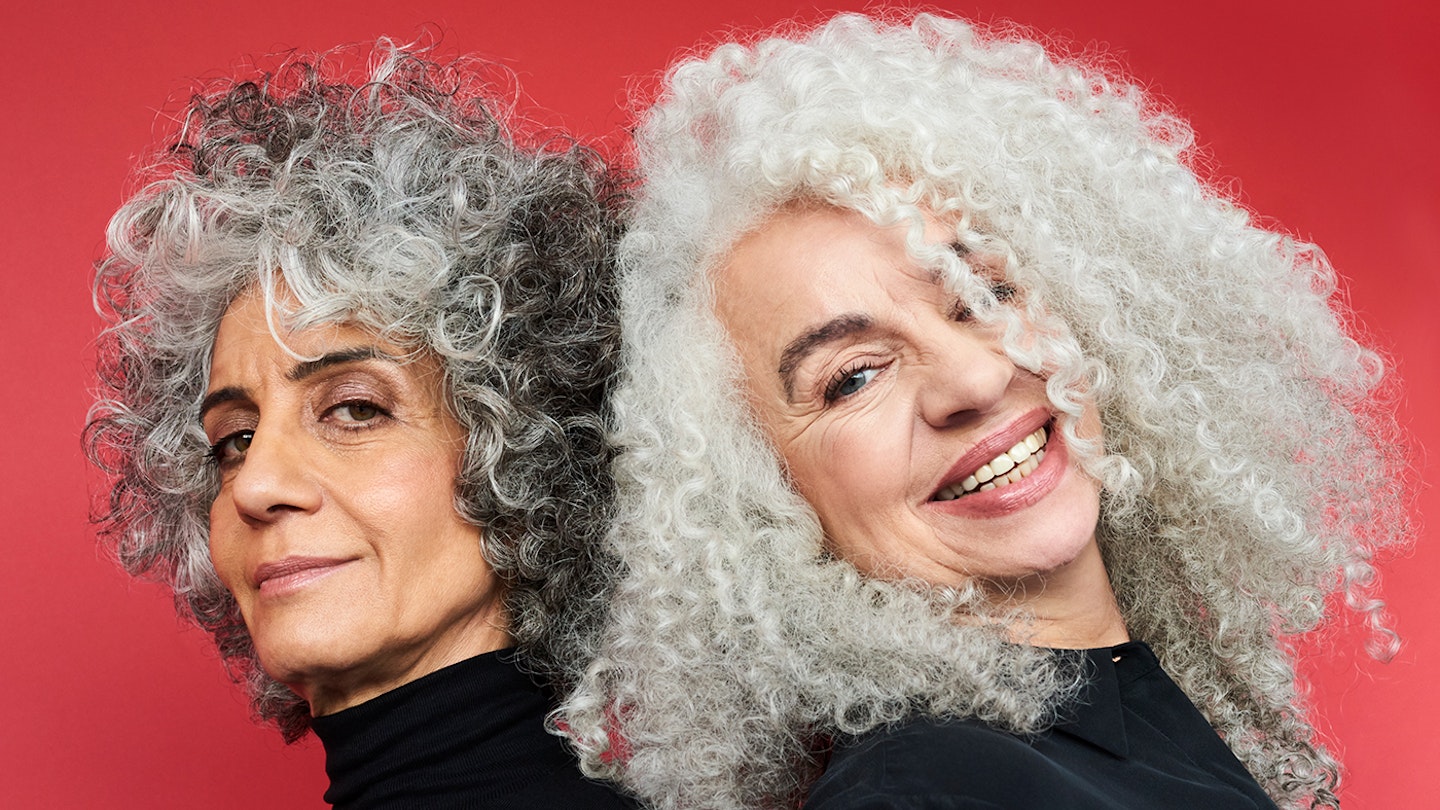If you've got curly hair, you'll probably know better than anyone that one person's curly hair isn't the same as another person's. In fact, there are different kinds of curly hair, each of which requires different types of care, styling techniques and curly hair products to maintain and nourish your locks.
Understanding different curly hair types and figuring out which category your hair falls under is the first step towards creating a haircare routine that works for your hair type. This includes choosing from the best shampoos for curly hair, finding out the best hair brushes that work for your hair type and using these products to keep your hair healthy and well-maintained.
Why is my hair curly?
As well as genes, there are other factors that make hair curly. This includes the hair follicle and the hair shaft.
The hair follicle is one of the main factors and on someone with straight hair, the hair follicle will look perfectly round, however on those with curly hair, the hair follicle will have an oval shape and the flatter the oval shape is, the curlier/kinkier the hair will be.
The way the follicle turns into the scalp is also taken into consideration. Follicles on straight hair will appear vertical from the skin into the dermis and those with curly hair will have more of a curve.
In more simple terms, the curlier the hair, the longer it will take for sebum to travel down the hair – this is why curly hair tends to be a lot drier and in need of moisture.
The disulphide bonds that are on the hair shaft also play a role in what makes hair curly. The shaft refers to the hair itself, and what we see growing out of our head. Our hair is made up of Keratin and protein structures Disulphide Bonds and Hydrogen Bonds help to hold the protein structures together and therefore play a pivotal role in the shape of our hair and how curly it is. Typically, on straight hair, disulphide bonds are evenly distributed throughout the hair, whereas on curly hair, they are kept more together on one side, resulting in waves/curls/kinky hair.
Hair Type Chart

What type of curls do I have?
According to the chart pictured above, it is easy to figure out what kind of hair you have by observing how your natural hair dries after a shower. I have noticed this is when your hair's natural curl patterns show up most prominently. If your hair hardly has any waves, then it falls under the category of Type 1 -Straight hair.
However, if you do see gentle waves in your dry hair, you have Type 2 – Wavy hair. If the pattern of your hair resembles loose coils or curls, then your hair falls under Type 3 – Curly hair and if the curls are much tighter, then it is classified as Type 4 – Kinky hair.
The alphabets that follow the numbers indicate the level of waves, curls or coils in your hair and the higher the alphabet, the more textured your hair is. Since we are looking to understand curly hair types in depth, we will get into more details about Type 2 hair and onwards up to Type 4 hair.
Curly Hair Types
Type 2 – Wavy
Type 2 wavy hair falls in between straight and curly. Wavy hair can be treated and styled like curly hair to get your waves to look more defined. Depending on the intensity of waviness, hair can be classified into 3 types – 2a, 2b and 2c.
2a wavy hair is the loosest form of curly hair and it falls straight for most of the hair length, forming gentle waves near the end. The root and majority of the length does not have any curls. Celebrities like Emma Stone have this hair type.
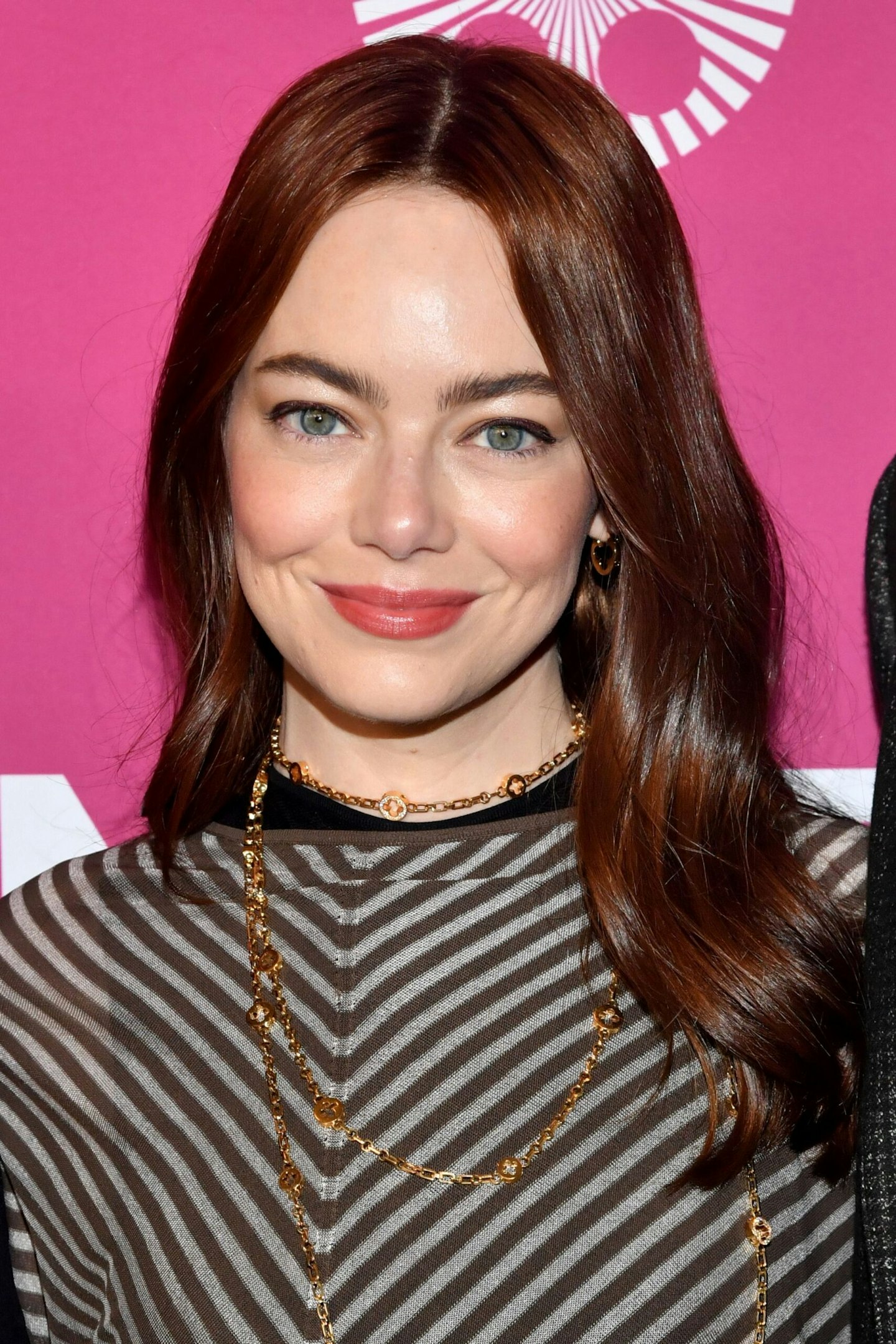
2a hair is usually low on volume and can fall a little flat at the roots. This is why your styling should be focused on increasing the volume and definition at the roots, so your hair does not look weighed down. While choosing products, lighter creams and conditioners would work better to prevent heaviness and ensure your hair does not look greasy. You might also have to go for a stronger shampoo to eliminate grease and maintain bouncy waves. Volumizing products are also great to add more body and volume to your hair. You can also opt to use the best dry shampoos to get rid of grease or excess oil on days when you don't want the hassle of shampooing and conditioning.
 LookFantastic
LookFantasticwww.lookfantastic.ie
Since 2a wavy hair is more prone to looking flat and dull, the Color Wow Raise the Root Spray is a good product to invest in as it increases the volume of your hair and also works as a heat-protecting mist. You can use it before blow drying or air drying to add more body to your hair. It gives you a visible thickening and lifting effect, with long-lasting body and bounce to fine, flat hair. The added UV filters also protect your hair while styling.
Pros
- Increases the volume of your hair and also works as a heat-protecting mist
- Gives you thickening and lifting effect
- Adds long-lasting body and bounce to fine, flat hair
Cons
- Reviewers have shared that it might not suitable for curly hair
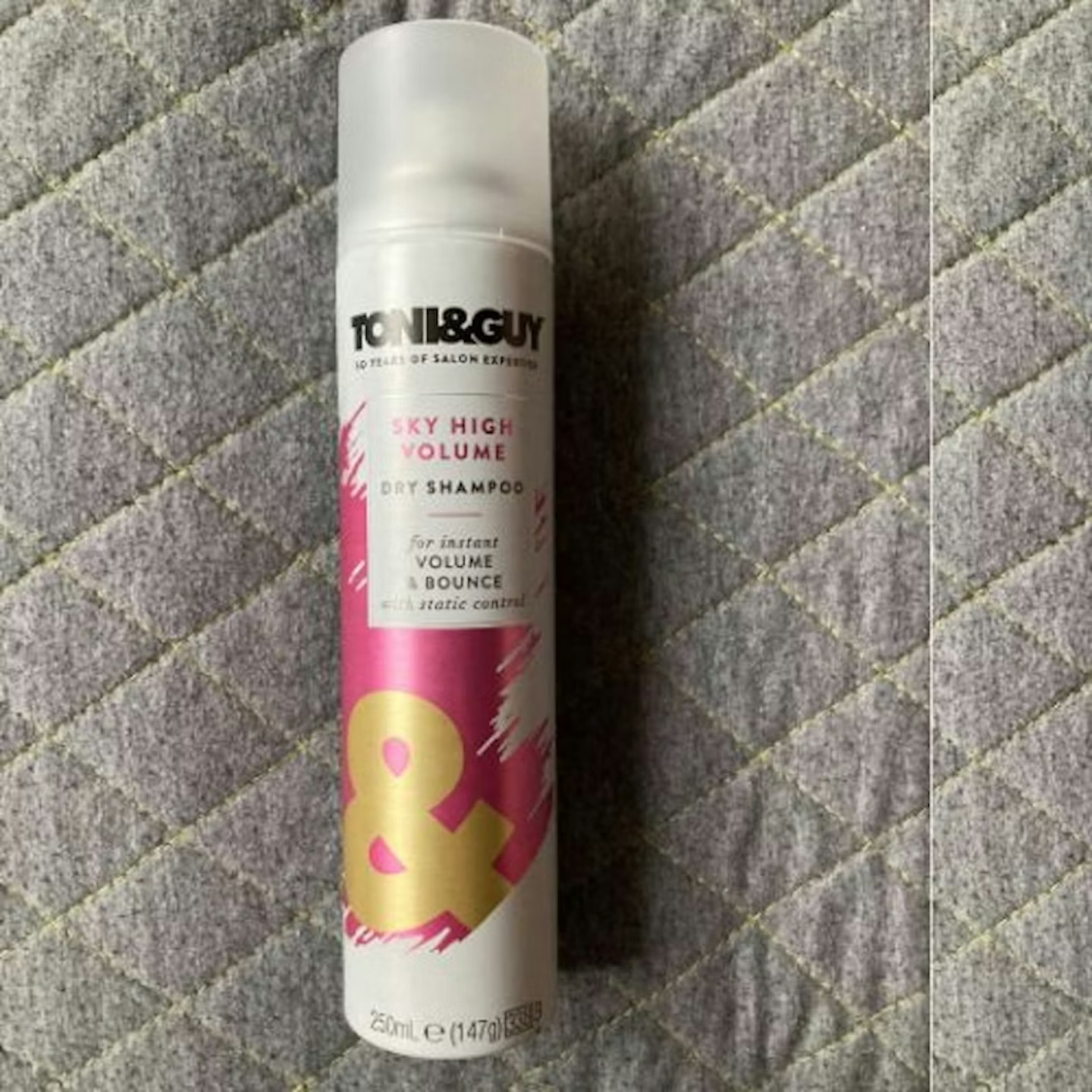 Arabella Horspool
Arabella HorspoolThe Toni & Guy Sky High Volume Dry Shampoo was tested and reviewed by Arabella Horspool, Commercial Content Writer for Yours.co.uk and she said that out of all the products she tried, this dry shampoo added the most volume to my hair whilst wicking away moisture. Unlike other formulas, you have to spray this one from your roots to the tips. "My hair felt lifted and bouncier; however, as I have quite thick hair, I did need to apply a lot of product, which didn't weigh my strands down but did clump them together," she said. So it is best suited for finer and thinner hair (as the bottle suggests), and you won't need to apply as much product.
Pros
- Hair looked voluminous and more bouncy
- Wicks away grease
Cons
- Not ideal for thick hair (as a lot of product may be required)
2b wavy hair is characterised by s-shaped waves that form from the mid-length of your hair and downwards. There might be very soft waves or curls near the roots, but otherwise mostly straight. You may notice a little shrinkage when your hair dries. Celebrities like Kate Winslet have type 2b wavy hair.
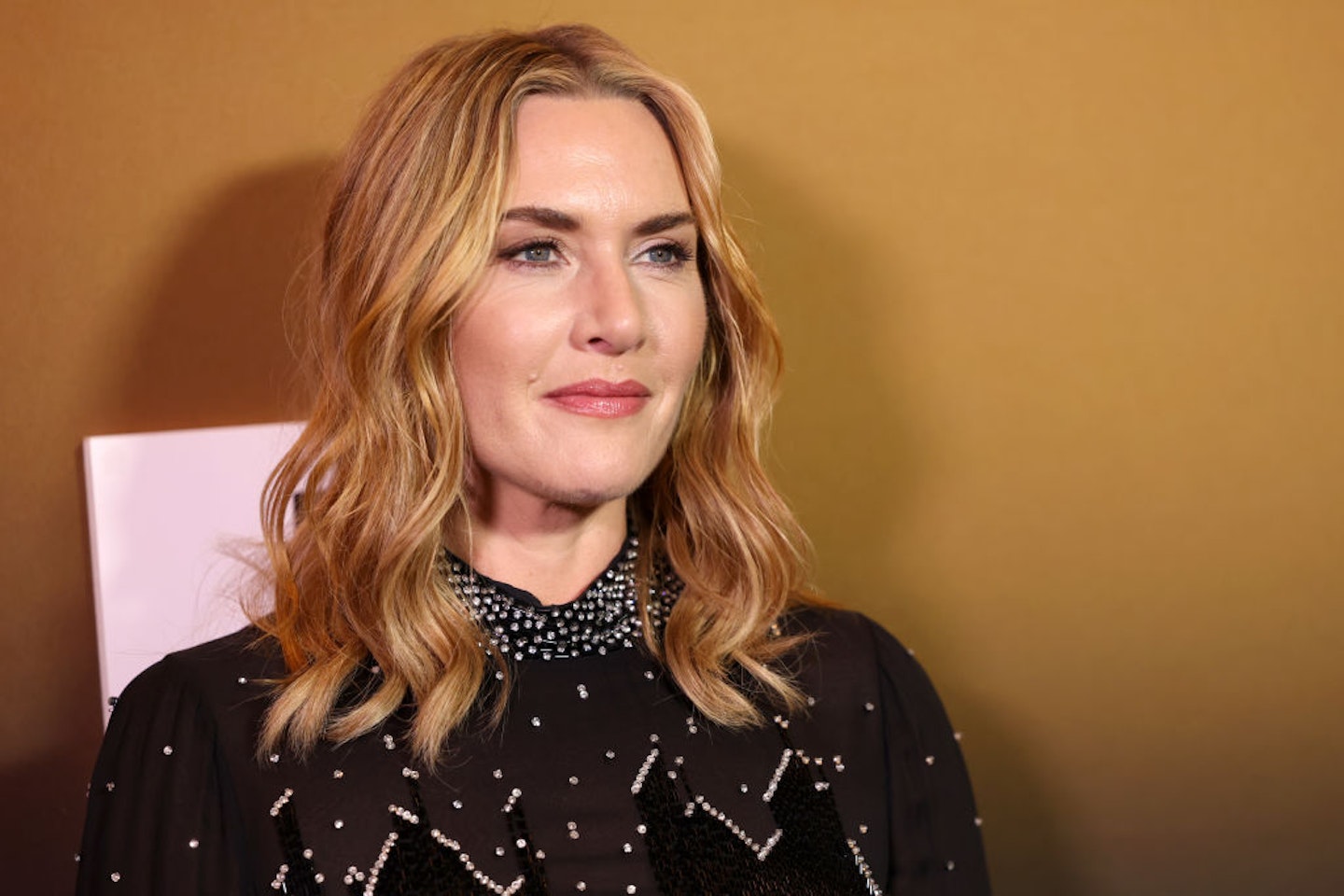
With 2b hair, your waves may not stay defined the same way throughout the day and can loosen every day since the last wash day. This is why 2b wavy hair required products can hold wave pattern for a long time. But at the same time, the products should not be too heavy that it weighs your hair down as well. So leave-in conditioners for dry hair that is lightweight and works for fine hair would be the best products to go for.
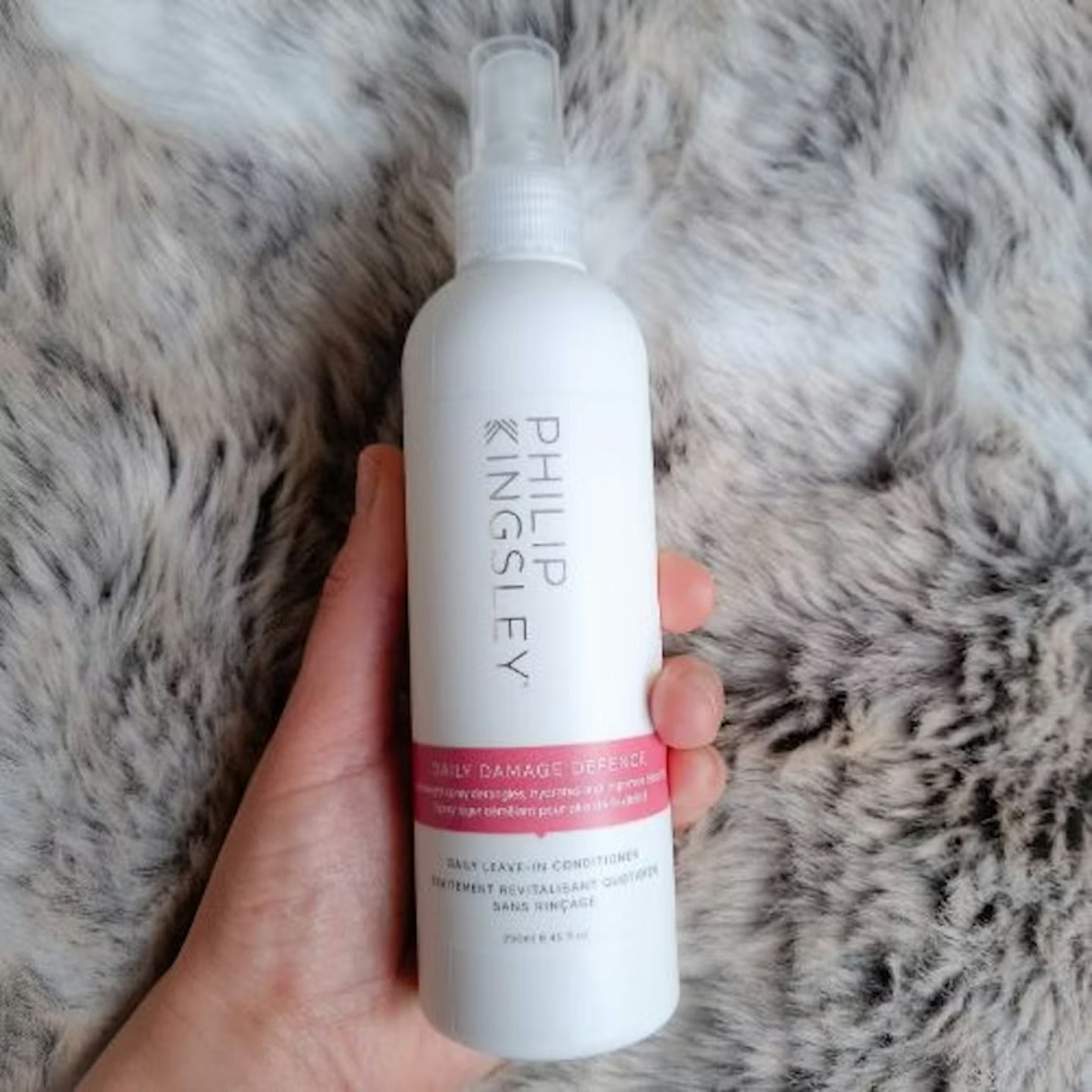 Natalie Knowles
Natalie Knowles www.philipkingsley.co.uk
The Philip Kingsley Daily Damage Defence Leave-in Conditioner was tested and reviewed by Natalie Knowles, Commercial Content Writer for Yours.co.uk and she said that this product is great for those who find traditional cream conditioners too heavy. "This lightweight spray works wonders. I’ve been using it daily before blow-drying and styling, and it makes my hair feel incredibly soft without weighing it down. I also love that there’s no oily build-up on hair, and it helps with frizz control and manageability," she said.
However, this product may not be ideal for thicker or coarser hair types, as it didn’t seem to work well for my mum's hair. So, it’s worth noting that it won’t suit all hair types. Although it’s on the pricier side (£30 for 250ml), it’s packed with ingredients like Hydrolyzed Elastin, amino acids, proteins and Pro Vitamin B5, which work together to strengthen, smooth and regulate moisture. If you have finer hair and struggle with frizz or tangling, this is definitely worth considering.
Pros
- Lightweight spray that doesn’t weigh down hair
- Great for frizz control and improving manageability
- Works well for finer hair types
- Helps protect against environmental damage and preps hair for styling
- Packed with strengthening ingredients
Cons
- May not be as effective on thicker or coarser hair types
2c wavy hair – You have this hair type if you feel your hair constantly oscillates between looking wavy one day and curly the next. This hair type has more defined waves, body and volume. It can be a mix of light waves, soft waves and defined waves. You may also notice that a curl may not form uniformly throughout the length of your hair. You can see this hair type on celebrities like Simone Ashley.
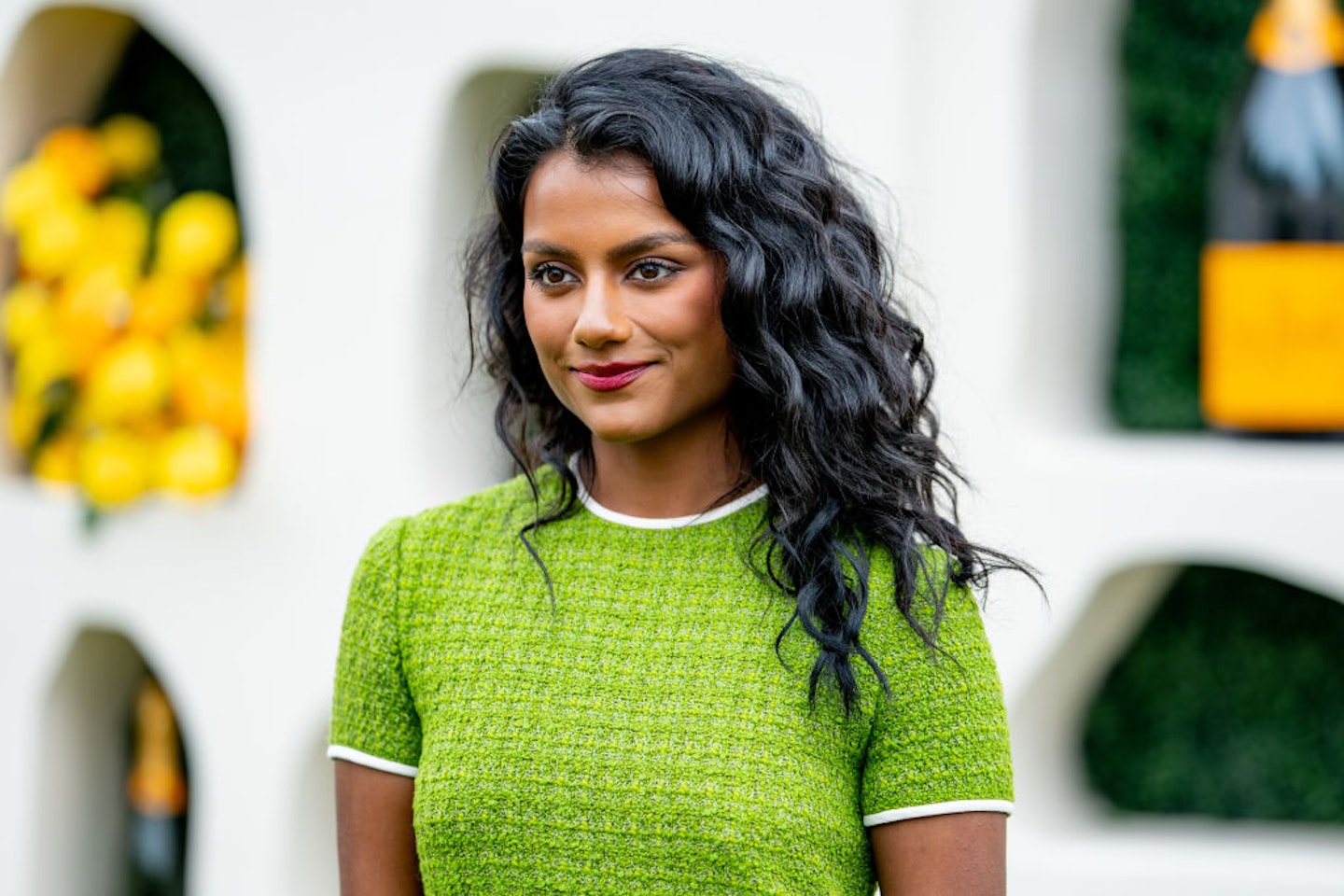
This type of hair is more prone to frizz than 2a or 2b wavy hair and you will benefit from a good frizzy hair remedy like serums or conditioners. You can also keep your waves and curls more defined using curling creams and a trusty styling method.
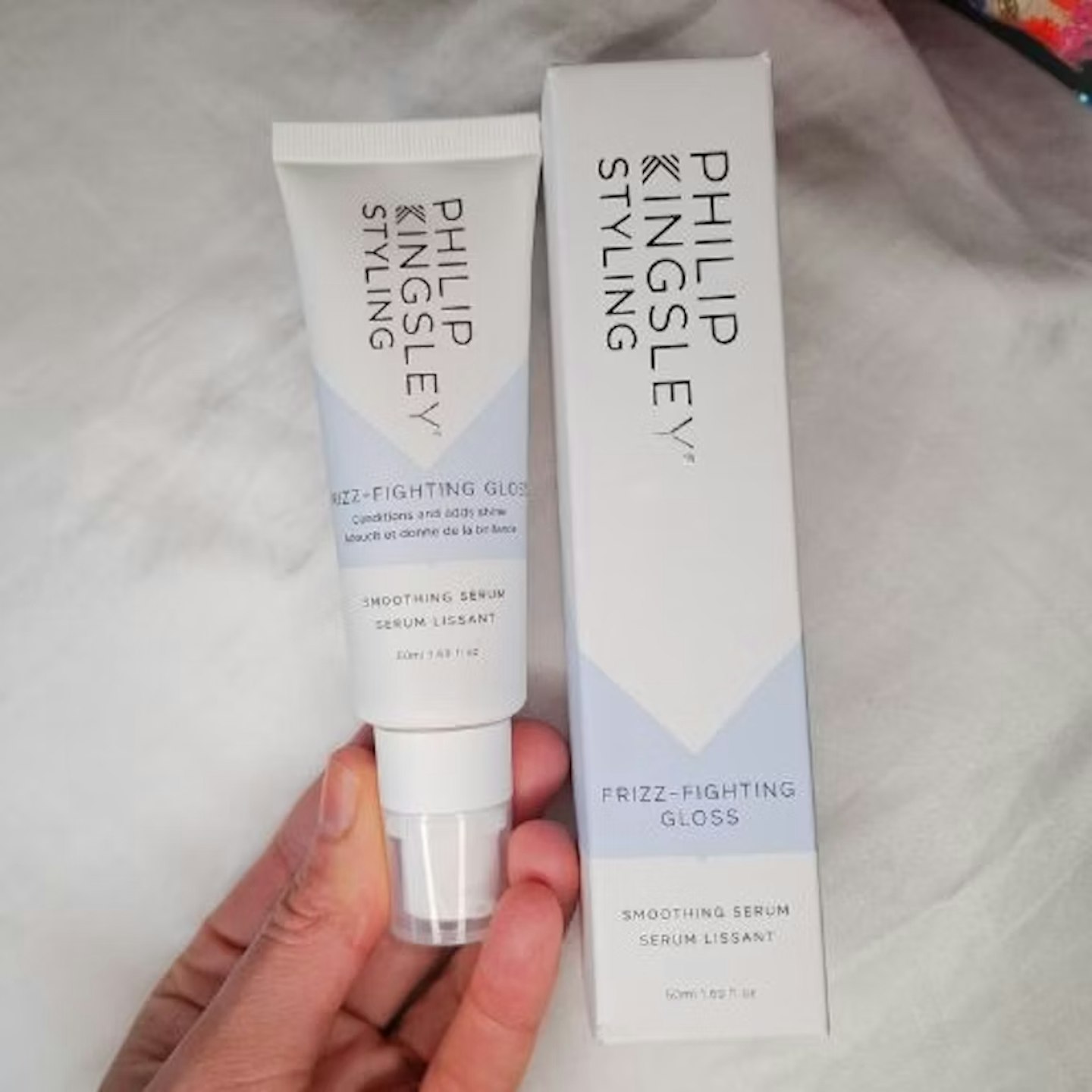 Natalie Knowles
Natalie Knowles www.philipkingsley.co.uk
The Philip Kingsley Frizz-Fighting Gloss was tested and reviewed by Natalie Knowles, Commercial Content Writer for Yours.co.uk. She shared that if you’re looking for the ultimate serum to control frizz and add mirror-like shine, this product is unbeatable. It instantly tames flyaways, leaving hair silky-soft, manageable and beautifully glossy. It’s a conditioning, heat-protecting formula that fights frizz, improves moisture retention and helps extend colour longevity.
Phytantriol enhances the hair’s softness, body and shine while helping damaged or chemically treated hair retain moisture. A silicone blend coats each strand with a protective layer, preventing damage and adding a sleek, polished finish. It also provides protection against heat damage up to 190°C—perfect for those who regularly style with heat tools.
The clear, viscous serum absorbs effortlessly into the hair without feeling greasy. A tiny amount goes a long way and the tester loved how this serum enhances gloss and elasticity, making hair look and feel healthier.
Pros
- Instantly tames frizz and flyaways
- Adds incredible shine and softness
- Lightweight, non-greasy formula
- Protects against heat damage up to 190°C
- Helps retain moisture and extend colour-treated hair
- Makes hair easier to brush and style
- Works especially well on coarse and porous hair
Cons
- Only available in a small tube—wish there was a larger size
- May need additional product, such as hair spray, for extra hold when styling
How to style wavy hair?
Wavy hair can be styled exactly like curly hair with curling gels, creams and leave-in conditioners by using the scrunching method.
All you need to do is apply a styling product works that works for you to wet hair, comb it through the lengths and scrunch it to add more definition to your waves.
The main difference between wavy hair and curly hair when it comes to care, maintenance and styling is to use lesser quantities of products as wavy hair retains more moisture and oils than curly hair. So, it might require more frequent washes, but less conditioning and styling products. This will ensure wavy hair is not weighed down and feels light, healthy and nourished.
Type 3 – Curly
Curly hair has more of a spiral shape and volume. Curls and waves would be more evident even towards the roots and you will see significant shrinkage when your hair dries. Type 3 curly hair can be classified into three types – 3a, 3b and 3c – depending on the intensity of the curls.
3a curls are defined by large, loose and spiral-shaped locks. This type of hair has considerable body and volume, although it can appear a bit flat at times. Celebrities like Zendaya have this type of hair.
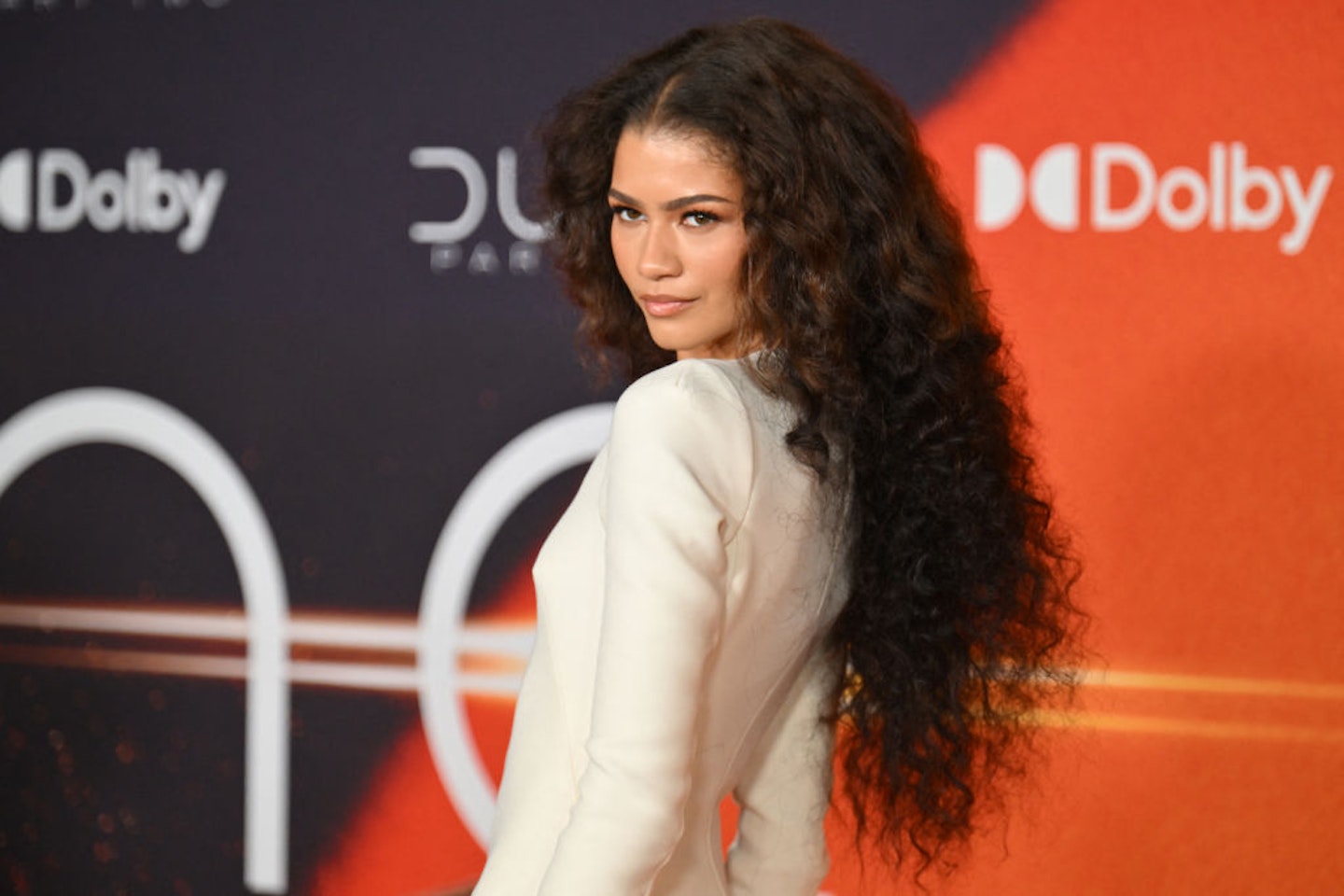
Dryness can be an issue, which will require and more hydrating products and styling creams to maintain curl definition without frizz. This type of hair will benefit from styling products and following the curly girl method. Make sure you are applying the products through the entire length of the hair before scrunching. This will ensure hair ends are moisturised and nourished.
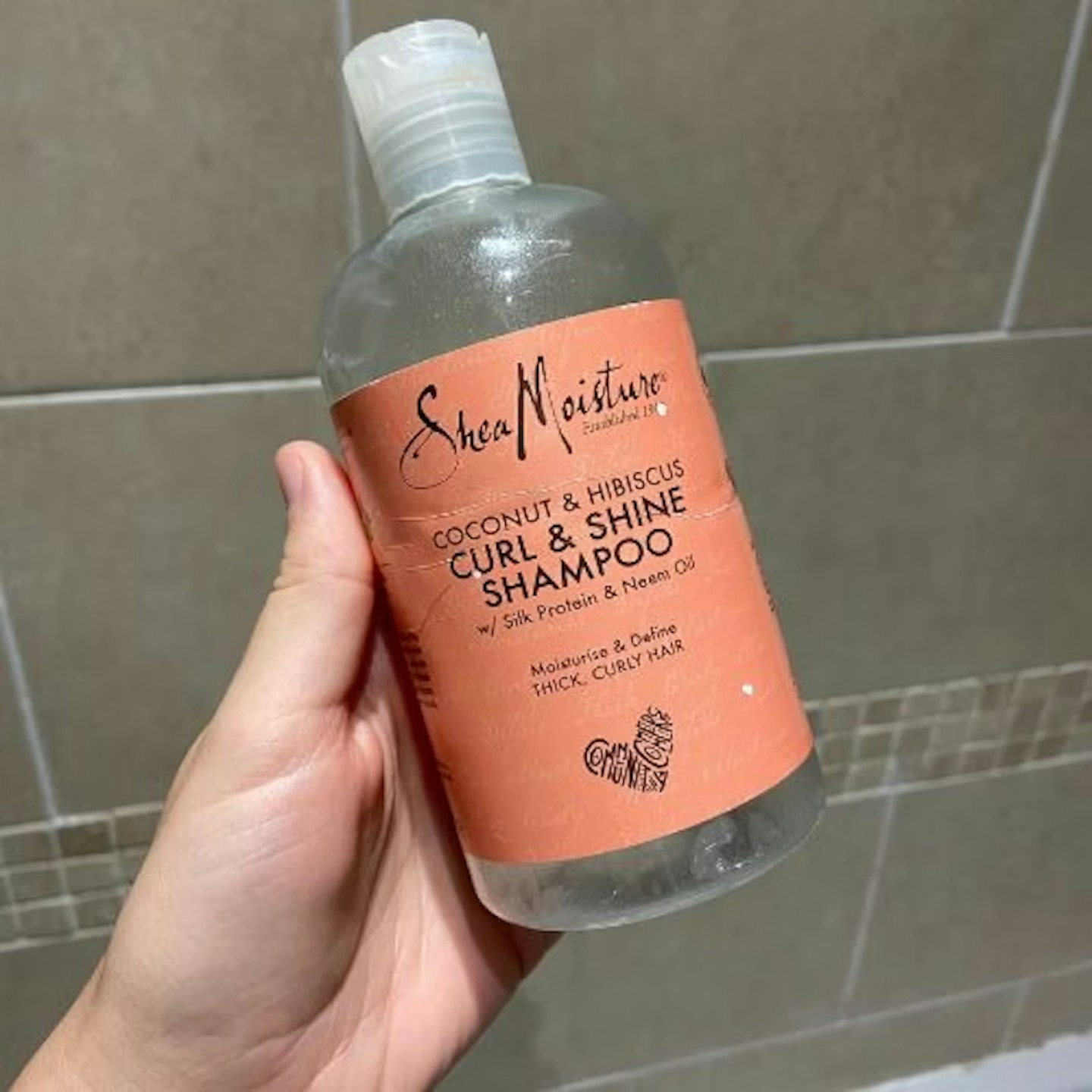 ELLA CROFT
ELLA CROFTwww.boots.com
The Sheamoisture Coconut & Hibiscus Curl & Shine Shampoo was tested and reviewed by our SEO strategist Ella Croft and she said, “This shampoo was one of the first products I tried when I started practising the curly girl method and I still continue to use it. From the first use, it made such a difference to my hair.” It is cleansing but also gentle. It doesn't give my hair that awful squeaky, stripped-away feeling, and it leaves your curls feeling moisturised, defined and frizzy-free.
Pros
- Great for regular use
- Leaves curls moisturised
- Cleansing but also gentle on hair
Cons
- May need to give hair a deeper clean every so often
3b curls are tighter, ‘springier’ and more spirally with the curls starting from the roots of the hair. They are bouncy and defined ringlets. These curls will remain intact even with heat styling and they have more body and volume than 3a curls. You can see what type 3b curls look like on Julie Roberts during her ‘Pretty Woman’ era.
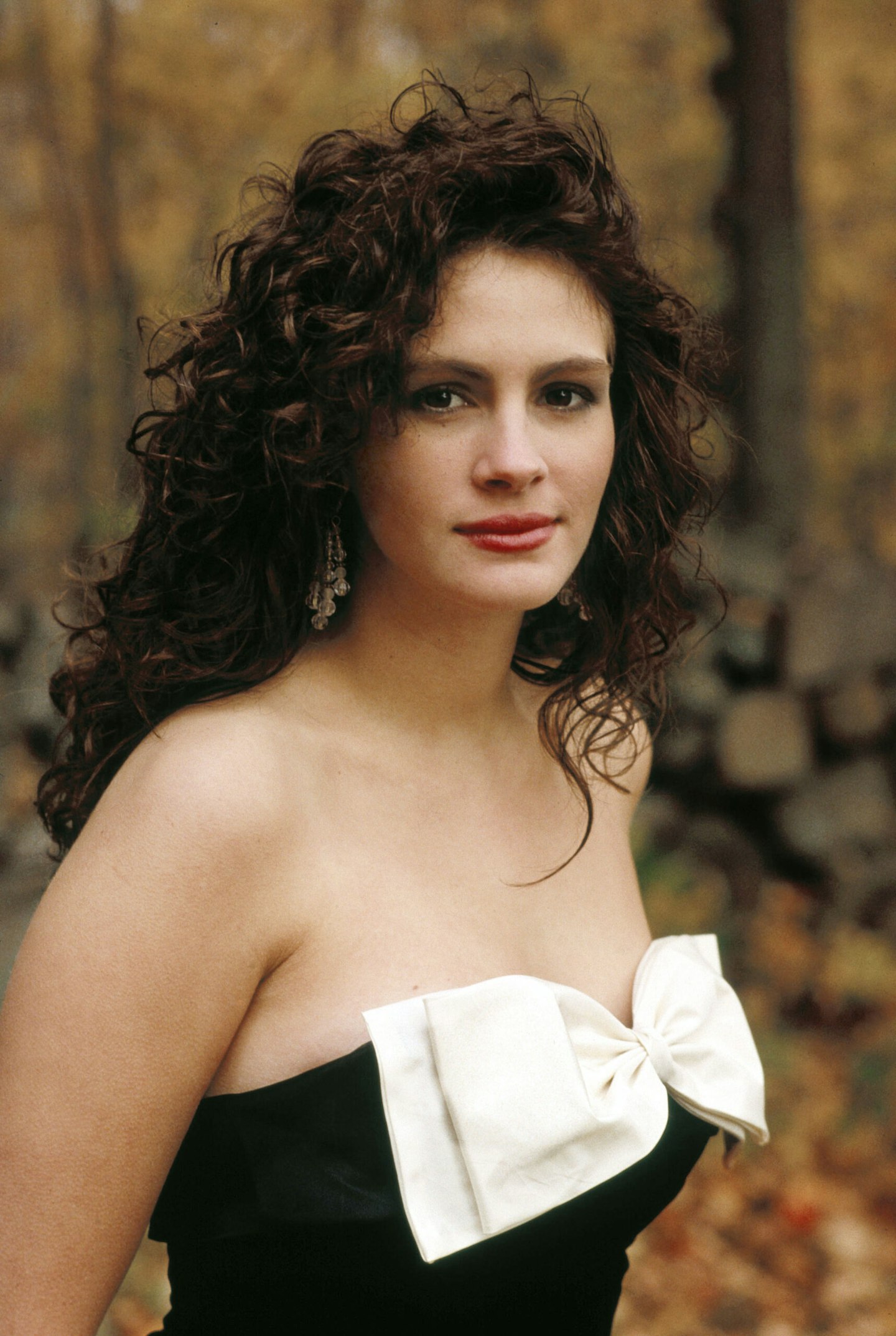
3b curly hair is more prone to dehydration and frizz, if it is not treated with hydrating creams, leave-in conditioners and nourishing oils. The best type of styling products to opt for would be ones that hydrate and hold curl pattern for a long time. This will prevent frizz and dryness. This type of hair might still require additional oils or serums to maintain curl pattern and hydration in between washes.
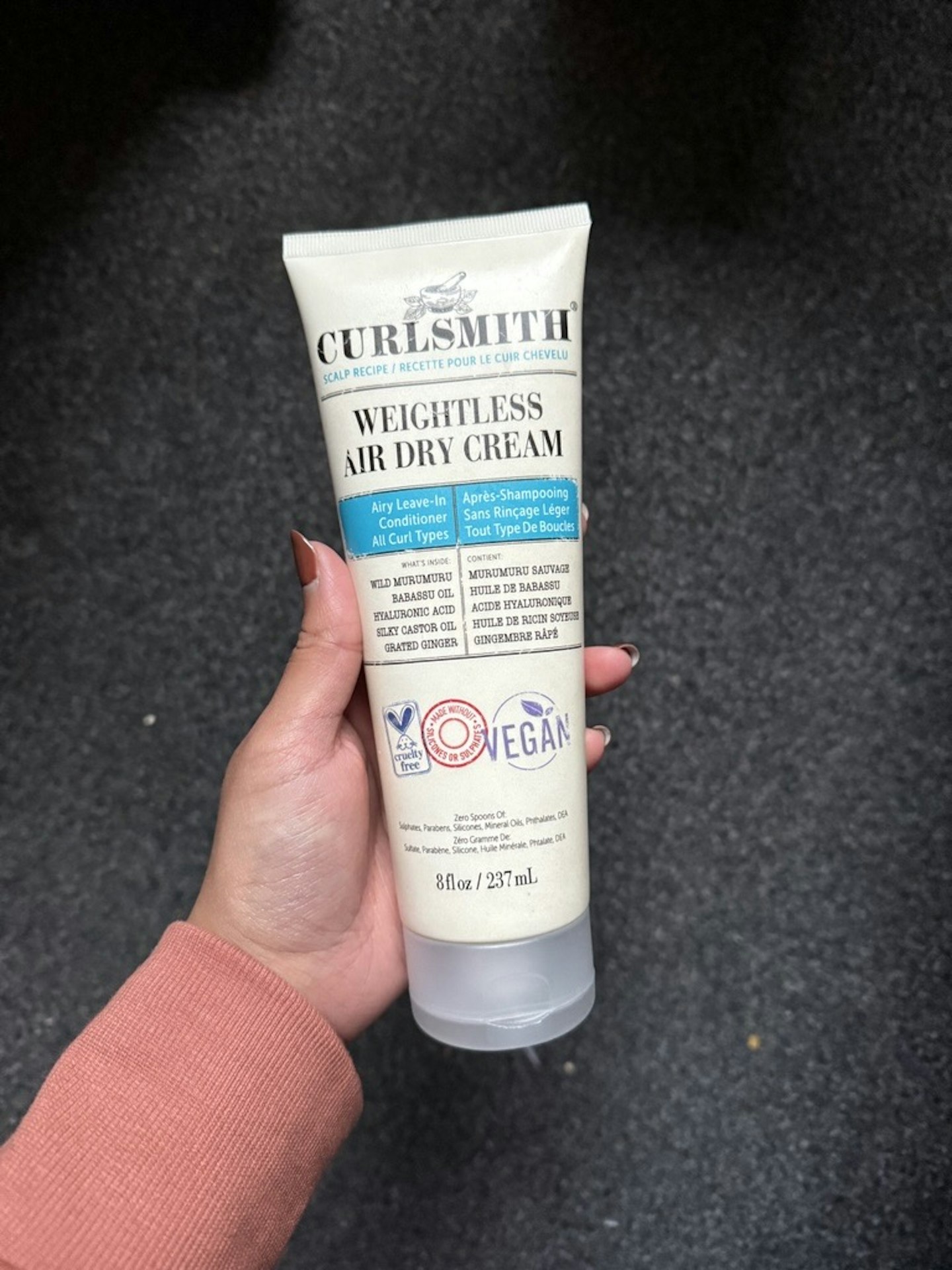 Akhila Thomas
Akhila ThomasThe Curlsmith Weightless Air Dry Cream tops our list of the best curly hair products as it helps to style your hair and also works as a versatile leave-in conditioner. This product has been tested and reviewed by Akhila Thomas, beauty and wellness writer for Yours.co.uk and she has been using it for several months now. The formula is lightweight and feels silky smooth on your hair, making sure it does not weigh down your curls or lead to excessive product build-up. This makes it suitable for fine hair too. “I have fine hair that is also curly, and this cream works wonderfully for my hair type. I take a generous amount and comb it through my hair and then scrunch it up to help the curls clump together,” she says.
It does a really good job of making your curls stay defined and set until your next hair wash, even after spending entire days out in windy weather. It also enriched with Castor Oil, Babassu, Jojoba and Murumuru Butter to add more moisture to your hair as curly hair is more prone to dryness. The only downside is that it falls in a slightly higher price range.
Pros
- Works as a curling cream to define and hold curl pattern for a long time
- Also has the benefits of a leave-in conditioner·
- Comes with added Castor Oil, Babassu, Jojoba and Murumuru Butter to nourish and moisturise hair
- Formula is lightweight and makes it suitable for all hair types
Cons
- You need a generous amount for the best results
3c curls are tight s-shaped corkscrew curls with a lot of volume and body. You can identify curl type by looking at its spring factor – which is measured by how far a curl stretches when you pull it. If your hair has a spring factor of three to six inches, you have type 3 hair. This kind of curls can be seen on celebrities like Beyonce.
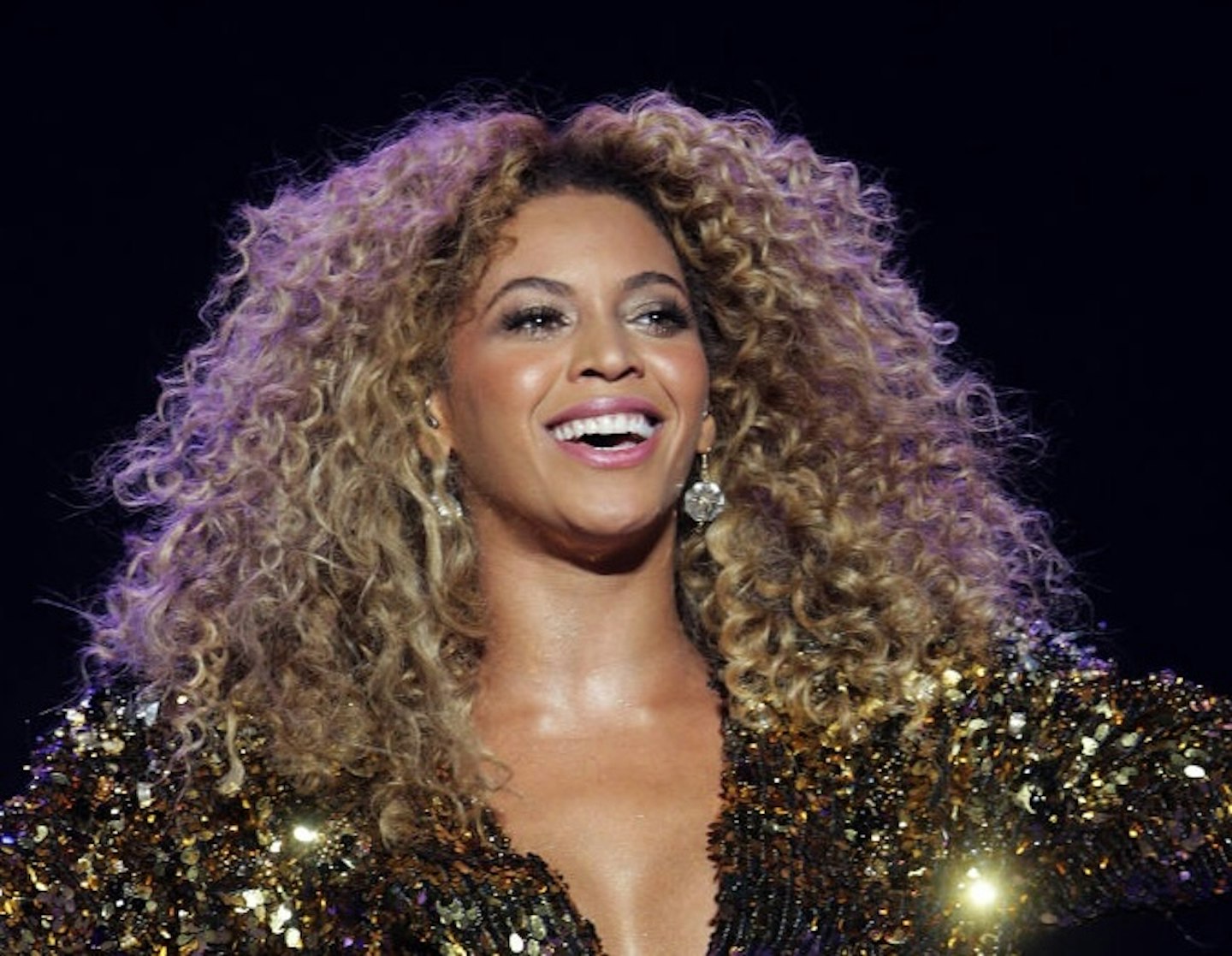
Adding and retaining moisture should be a priority when it comes to choosing haircare products for 3c curly hair. Make sure you use conditioners and leave-in conditioners to add extra moisture to your hair. Due to tighter coils, natural oils will take longer to seep down to the lengths of your hair which makes it more prone to dryness. This is why using curl creams that emphasise on hydration is key. It is also important that you don’t rub your hair too much, disturbing your curl pattern and also make sure you detangle only when hair is wet to prevent breakage.
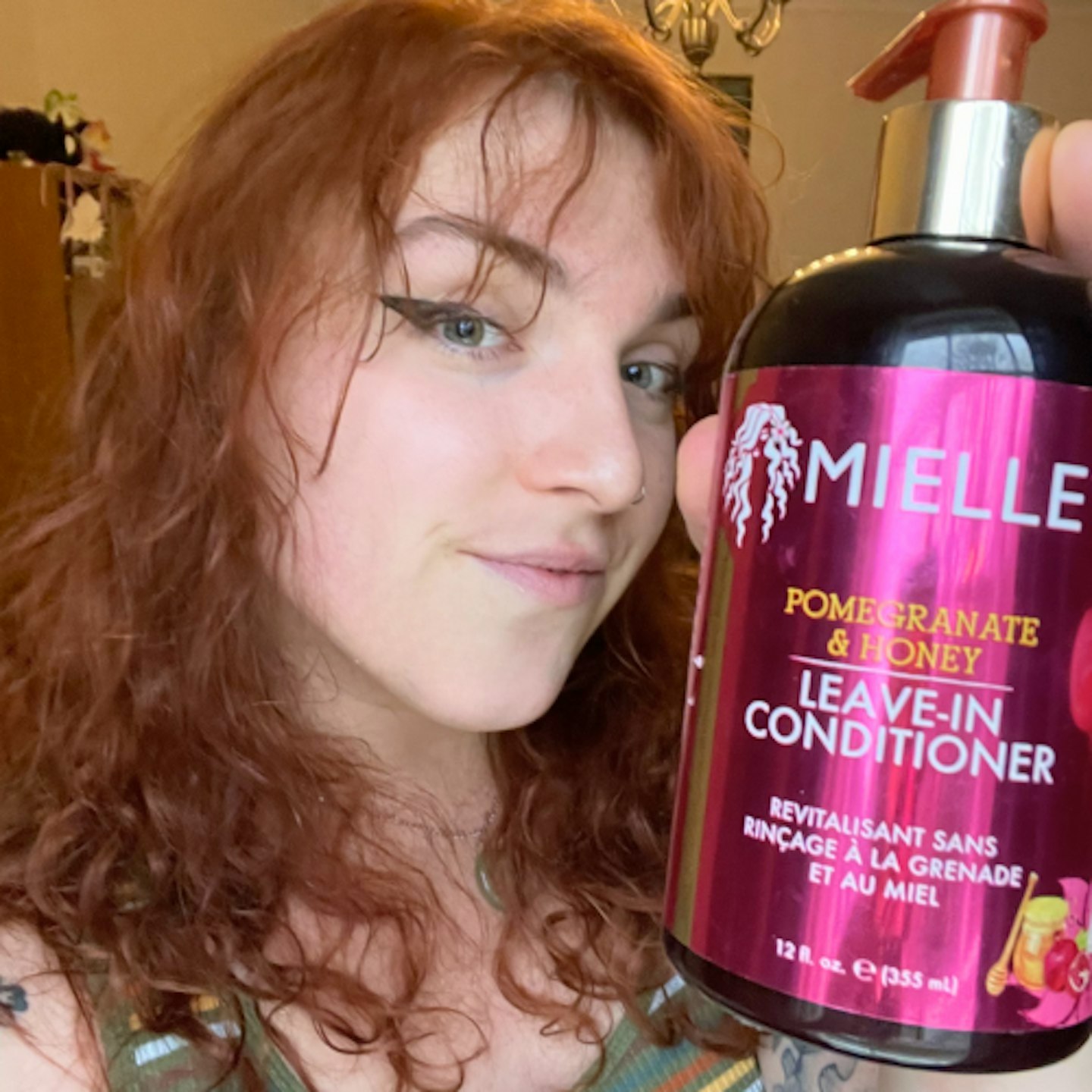 Piper Huxley
Piper Huxleywww.boots.com
When it comes to adding more moisture, products like the Mielle Pomegranate & Honey Leave-in Conditioner can work wonders. It was tested and reviewed by Piper Huxley, Commercial Content Writer and she has been on a lookout for a product that can tackle frizz for her thick, Type 3 hair. “Whether I've just stepped out of the shower and looking to style my hair or need an emergency curl refresh the day after conditioning, this Mielle Honey and Pomegranate Leave-In Conditioner is a godsend,” she says.
Enriched with babassu oil and citrus extract that keeps your hair nourished while also providing long-lasting moisture, this leave-in conditioner is very easy to apply (with or without a comb). "It helps detangle my hair - which is a task I dread and when I use this Mielle leave-in, my hair feels soft, hydrated and looks so shiny,” she adds. It leaves your hair smelling amazing and it feels very light, so it doesn't weigh down your hair.
Pros
- Great product for eliminating frizz and detangling hair
- Can be used to style hair and refresh curls between washes
- Enriched with babassu oil and citrus to keep you hair nourished and provide long-lasting moisture
- Easy to apply, with or without a comb
Cons
- Styling and defining curls to stay for a long time might be hard using just this product as it focuses more on hydration
Type 4 – Coily and Kinky Hair
Coily and kinky hair ranges from being S-Shaped to more Z-shaped. The curls are a lot tighter and can therefore make your hair appear shorter. The coils are densely packed, making hair feel very voluminous. Type 4 hair also experiences the most shrinkage, with hair appearing quite long when wet and coiling up into tight strands.
4a curls are s-shaped or o-shaped, tightly coiled corkscrew curls that form a spiral pattern. These curls form right from the root-level. You can also see that your strands grow outwards and upwards rather than hair that grows downwards and falls flat. This is what gives type 4 curls the gravity-defying volume and high spring factor. The texture ranges from fine to wiry and it is quite dense. You can see what type 4a curls look like on Shonda Rhimes here.

Dryness is a major problem that women with 4a curls face. While the density and volume might lead you to think that the hair is quite strong. This type of curls are very fragile and they are prone to dryness and loss of natural oils. This is why it is important to invest in a good sulphate-free shampoo that ensures effective cleaning without stripping your scalp and hair of natural oils that keep it nourished. Making use of protective hairstyles like twist-outs, Bantu knots, or crochet styles can help retain moisture and prevent breakage. Also make sure to condition and hydrate your curls with moisture-heavy products as your hair will love that extra hydration.
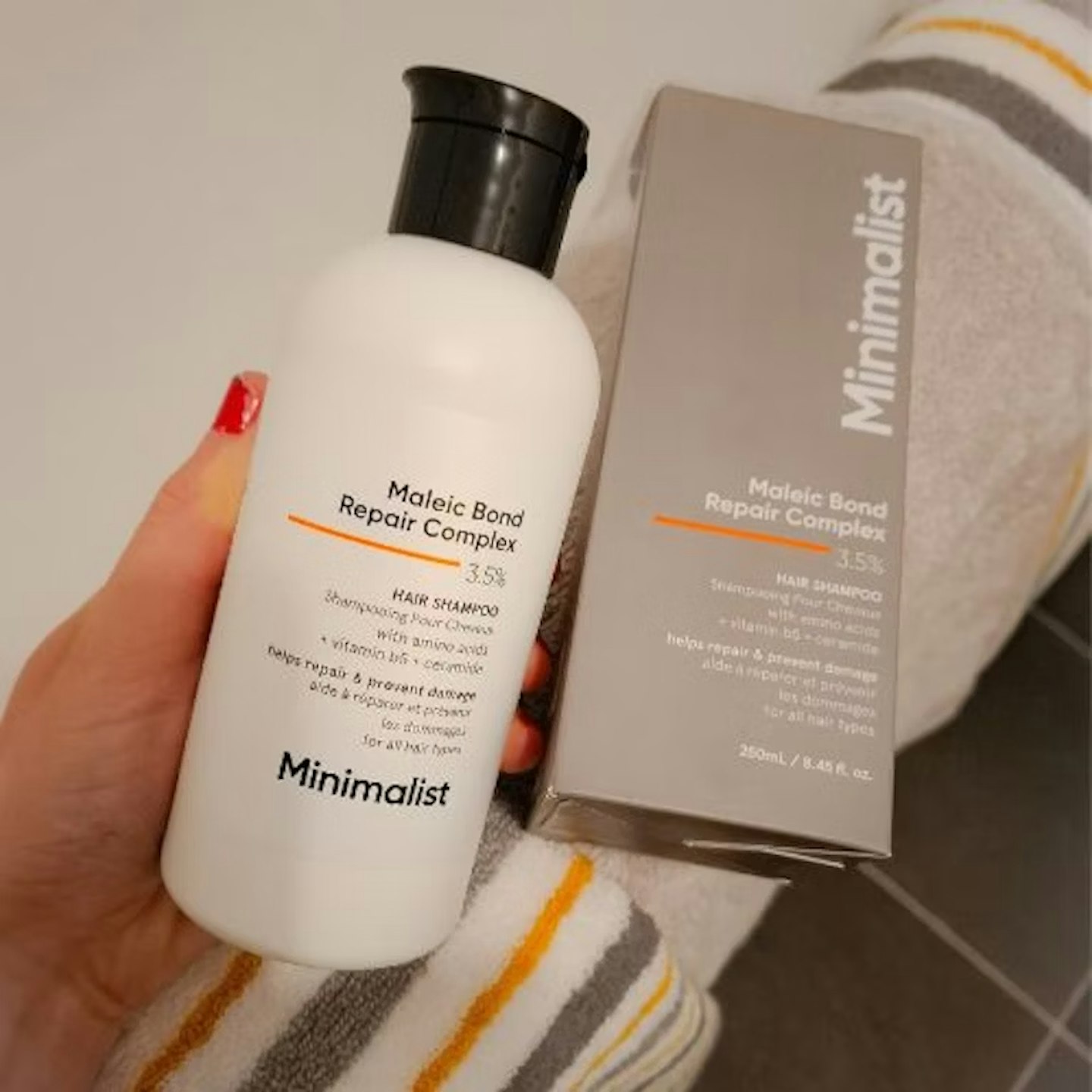 Natalie Knowles
Natalie Knowleswww.facethefuture.co.uk
The Minimalist Maleic Bond Repair Complex 3.5% Hair Shampoo was tested and reviewed by Natalie Knowles, Commercial Content Writer for Yours.co.uk and it is a product aimed at repairing weak and damaged hair. Enriched with maleic acid, amino acids and transglutaminase that repairs and prevents damage to hair bonds, it's effective against hair damage caused by heat styling, colouring, straightening and UV exposure. This is a balanced, sulphate-free shampoo that gently cleanses without drying out hair.
The reviewer tested Minimalist for several weeks and found it to be an outstanding shampoo for nourishing hair which is prone to being dry and frizzy. The shampoo is opaque and has a creamy texture. It's thicker than a standard shampoo and there's no discernible fragrance. It forms a thick, creamy dense foam to lather into hair. You don't need much, albeit if you have longer hair you may find yourself getting through the 250ml bottle faster. It almost feels like there's conditioner in it. It leaves hair feeling silky and nourished. The shampoo's detangling formulation means less hair breakage overall and it improves shine as well.
Pros
- Free from fragrance, sulphates and essential oils
- Hair feels nourished, stronger and shinier
- Suitable for all hair types
- Repairs and protects against hair damage caused by environmental stressors and styling
Cons
- If you have longer hair, you'll soon get through the 250ml bottle
4b curly hair is characterised by z-shaped curl pattern and tightly packed coils that have sharp angles and a wiry appearance. The strands will look much more denser and tightly coiled compared to type 4a curls. This type of hair experiences a lot of shrinkage, and it is also prone to dryness. Celebrities like Golda Rosheuvel have this hair type.
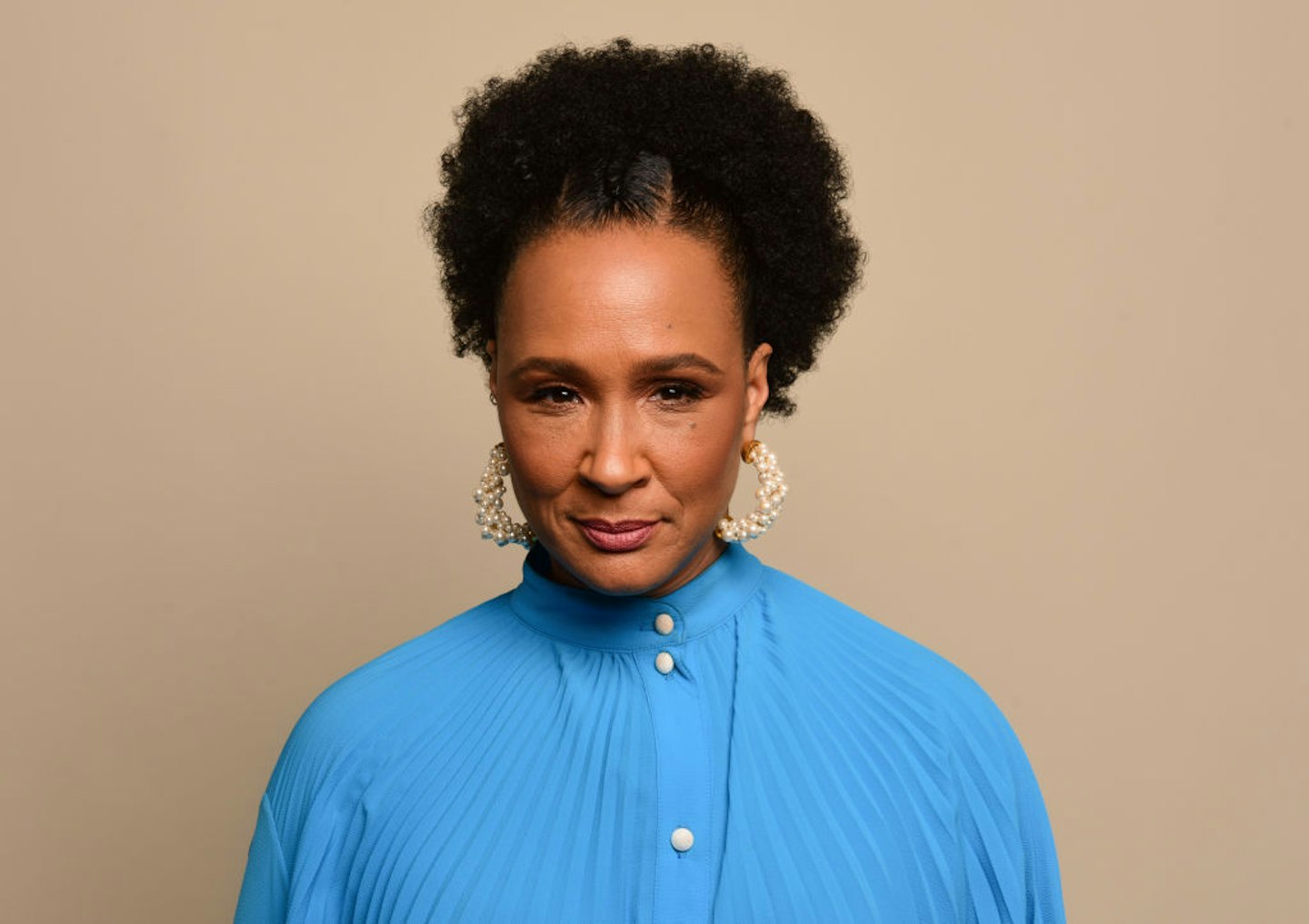
This type of hair is dense and looks voluminous. But hair strands can be prone to dryness, brittleness and therefore breakage. This is why type 4b curls should not be combed very often and when you do, ensure hair strands are wet which will make the curls loosen up and help the comb to pass through easily. You can also apply hydrating mousses, creams and leave-in conditioners to add that extra touch of moisture. This will help improve the texture and health of your hair if you are choosing to go for protective hairstyles as well. Protective hairstyles also enhance hair growth. Since this type of hair has very tightly packed coils that grasp onto hair products, continued use can lead to product build-up. This can be resolved with occasional hair washes using a good clarifying shampoo to cleanse your scalp and maintain hair health.
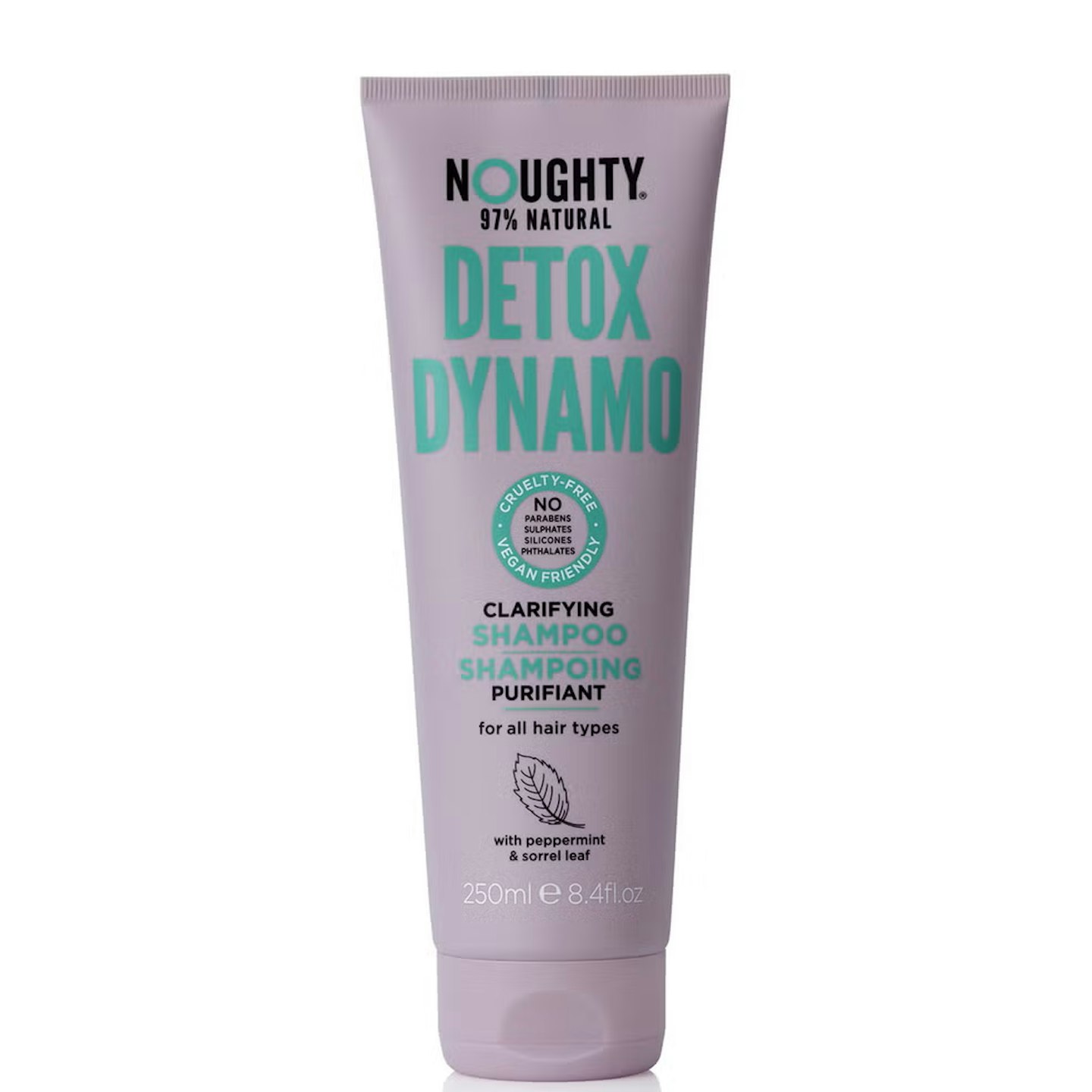 Boots
Bootswww.boots.com
The Noughty Detox Dynamo Clarifying Shampoo is designed to eliminate build-up caused by pollution, hard water, chlorine and residue of styling products. The formula is enriched with detoxifying peppermint that gives it a fresh fragrance. It also infused with sorrel leaf extracts that cleanse and moisturise your strands. The added sugar beet extract helps condition the hair. It is made up of 97% off natural ingredients.
Reviewers are happy about the fact that it deep cleans your scalp without leaving the lengths too dry. This is a great option if you are looking for a clarifying shampoo to use once in a while to get an effective detox from all build-up without stripping away a lot of natural oils. For coily and kinky hair types, this is essential as hydration is everything.
Pros
- Eliminates build-up caused by pollution, hard water, chlorine and residue of styling products
- Detoxifying peppermint gives a fresh fragrance
- Infused with sorrel leaf extracts that cleanse and moisturise
- Added sugar beet extract helps condition
- Deep cleans your scalp without leaving the lengths too dry
Cons
- Some reviewers mentioned that towards the end, it can be a bit difficult to get the last bit of the product out of the tube.
4c type curly hair is the most textured coily or kinky hair and they form tight, springy z-shaped curls. This type of hair is most prone to shrinkage and strands can shrink up to 75% of their length. Hair strands are often clumped together and form very dense curls that appear quite voluminous. Celebrities like Viola Davis have 4c type curls.
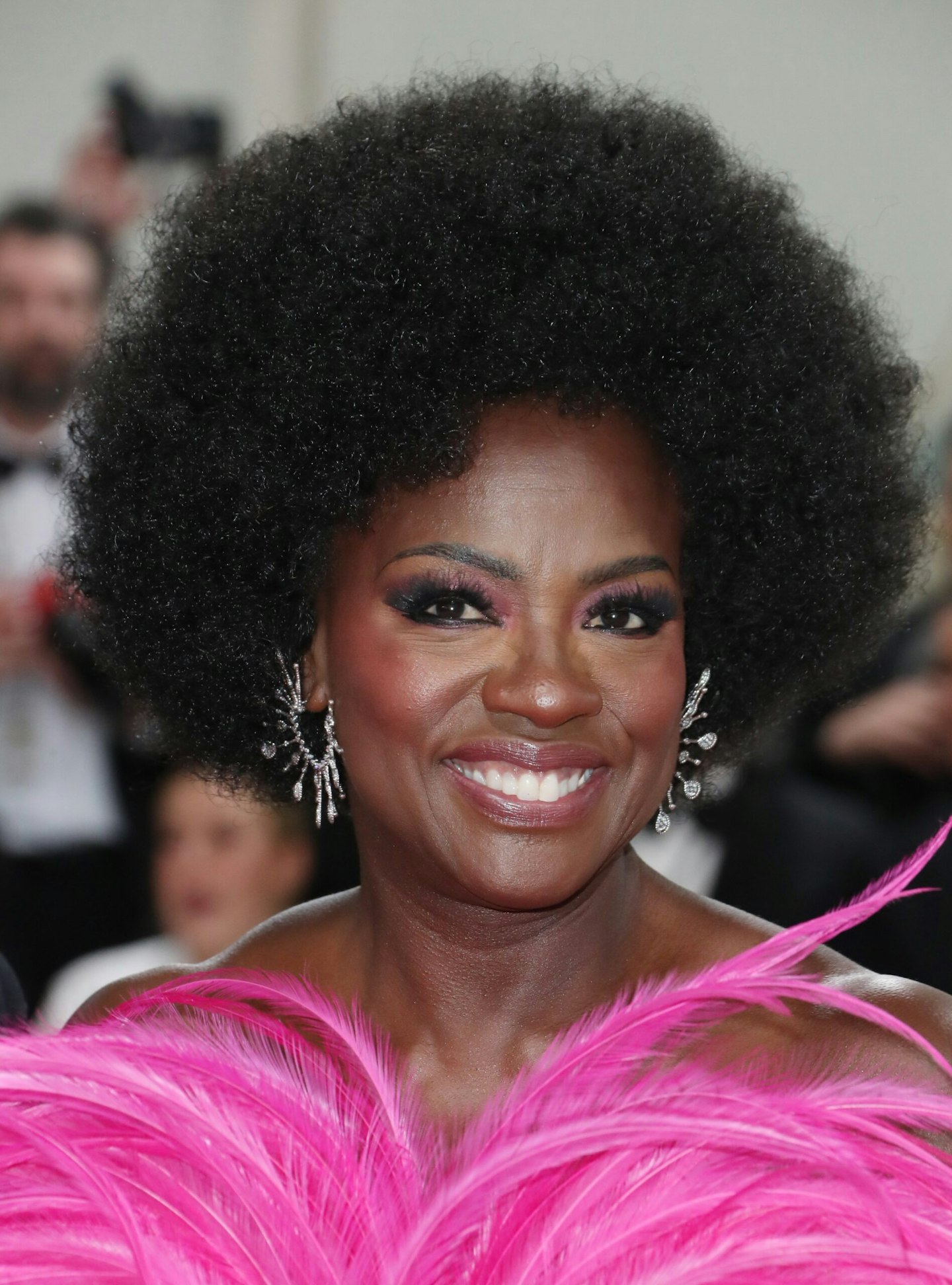
Since 4c curls are highly dense, clumped together and springy, they tend to get tangled, matted and therefore break easily. 4c hair is also very fragile and this is why it requires immense hydration and the right type of styling products.
To lock in more moisture, make sure you are using a conditioner to hydrate dry hair, followed by a moisturizing hair cream, mousse of leave-in conditioner. You can also follow this up by applying your favourite hair oil for extra moisture. It is also recommended to wash 4c type hair every 2-4 weeks as over-washing can strip off natural oils and make sure you are using a sulphate-free shampoo as well. Sleeping on silk or satin pillowcases will help reduce friction and frizz and protect your curls without disturbing them at night. Sleeping in silk or satin bonnets or hair wraps and using silk or satin scrunchies will also protect your hair from damage.
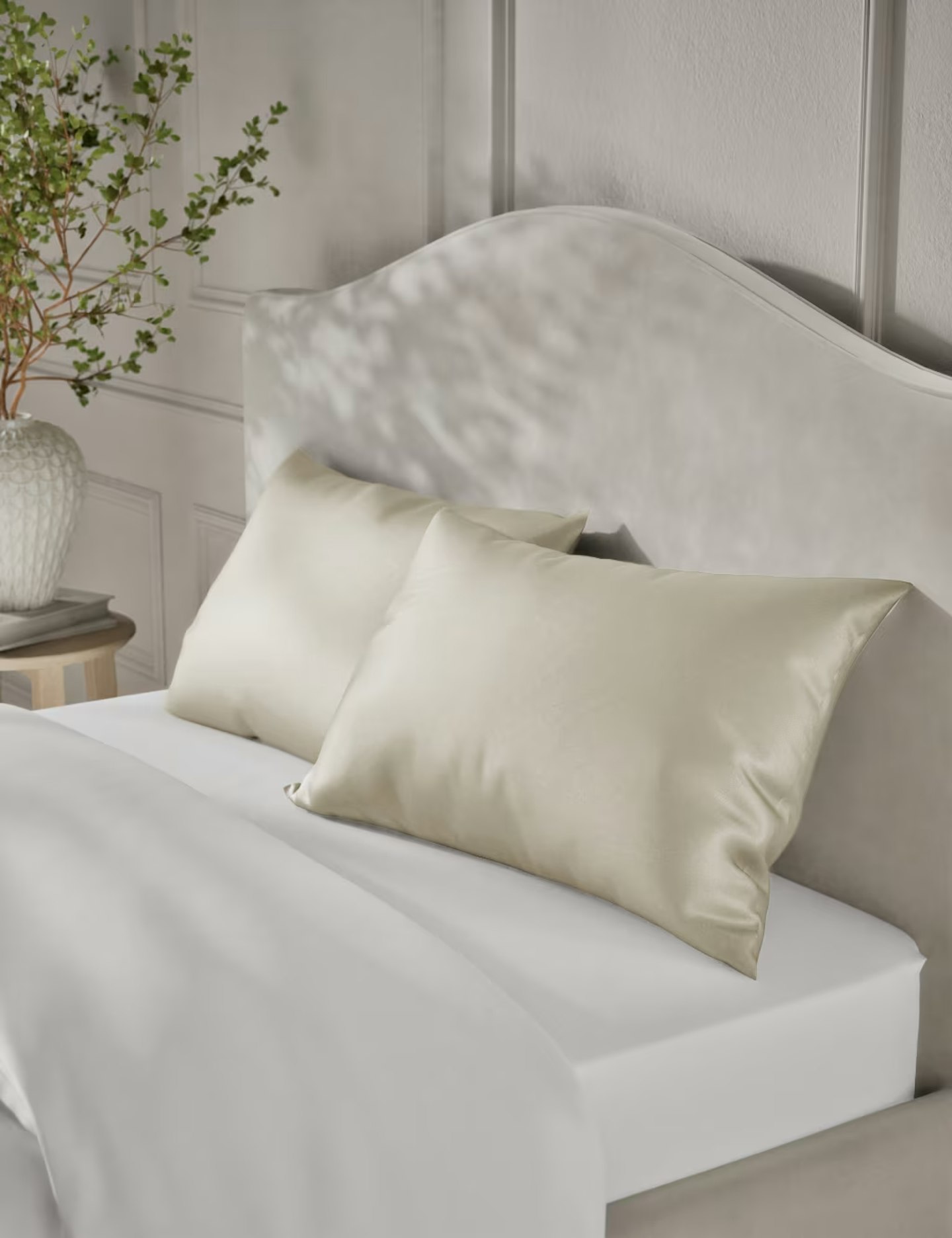 M&S
M&Swww.marksandspencer.com
You can always count on M&S for timeless elegance. Crafted from 100 per cent silk and priced at an affordable £30, it's a luxury that won't break the bank. Whether you're after a pop of colour or something more subdued, there's a shade for every taste. Its versatile rectangular design ensures a snug fit for most pillows. However, you will have to treat it with care as silk would require a delicate 40°C wash and isn't too fond of tumble dryers. Reviewers shared it has stopped their hair from becoming frizzy overnight and that it is great for sensitive skin.
Pros
- Made from 100 per cent silk
- Affordable price
- Available in a variety of colours.
Cons
- Requires a delicate 40°C wash
- Tumble drying is not advised
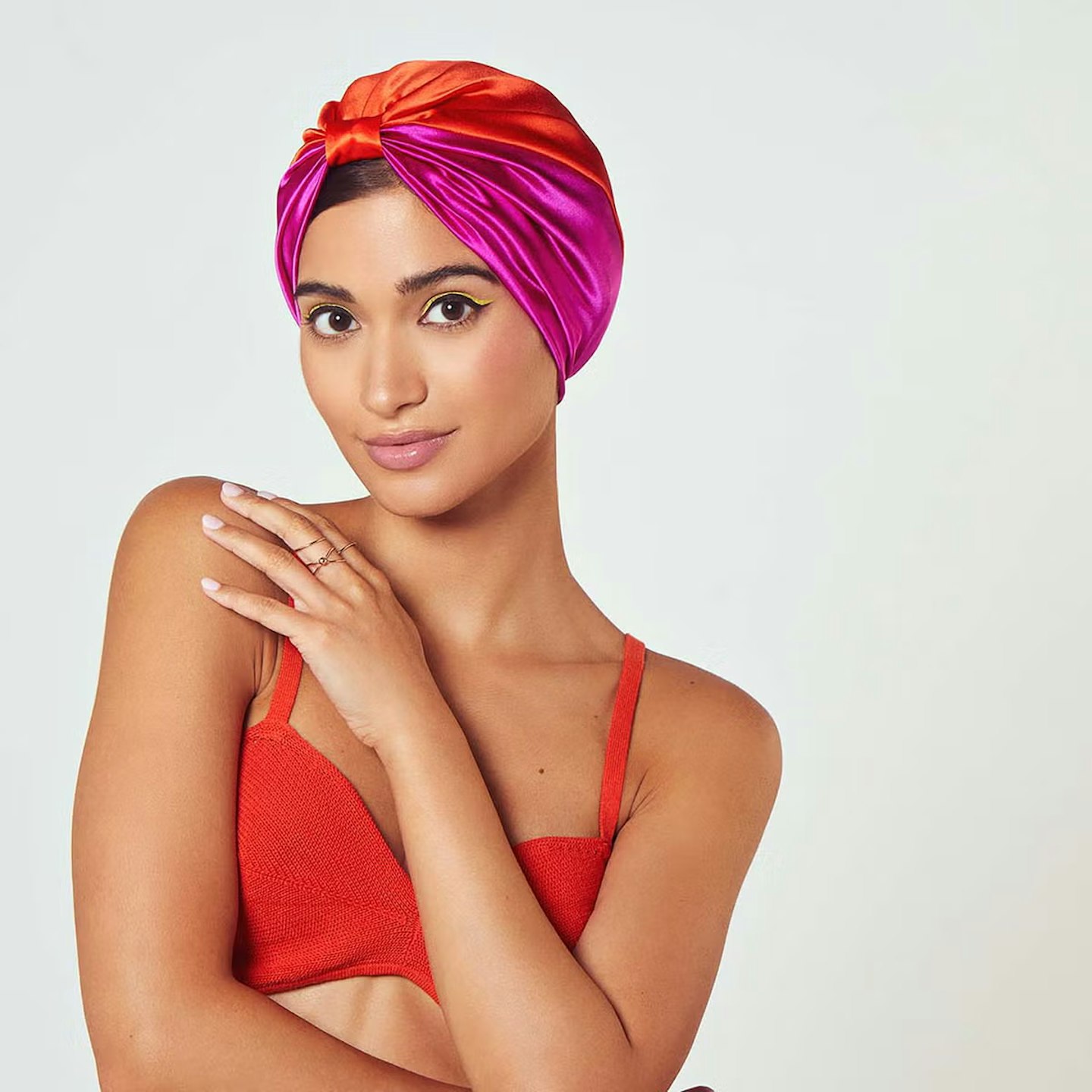 LookFantastic
LookFantasticwww.lookfantastic.com
The SILKE Hair Wrap protects the hair to eliminate the nightly friction of bed linen against your hair cuticles that causes breakages, frizz and split ends. It is made with the highest-quality 100% mulberry silk that prevents moisture absorption, keeping your hair nourished and hydrated while you sleep. We love this gorgeous, understated chic design and it is a one size fits all build that can accommodate long or short curls. It also comes with a discreet elasticated band that shrinks and expands to fit all head sizes Customers have shared that while it takes a few days to get used to due to the stitching on the front, it works wonderfully to keep hair shiny and smooth. You will have to pull it down over your ears to keep it securely throughout the night.
Pros
- Handmade in London with 100 per cent mulberry silk
- Chic design with discreet elasticated band to fit all head sizes
- Eliminates nightly friction and moisture absorption to prevent breakages, frizz and dryness
Cons
- Some found it slips during the night and you have to pull it down over your ears to keep it securely through the night
Why is it useful to know your curl type?
As someone with curly hair, I can share that it is so important to know your curl type to be able to look after and care for your curls the right way and with the right products. Curlier and coilier hair types require a lot more intense hydration than straight hair. On the other hand, using very intense hydration products on straight/wavy hair can have negative effects, making it appear oily, weighed down and flat. So it’s essential to use products best suited to your hair type that will enhance the look of your hair and keep it healthy.
Knowing your curl type will also allow you to become more aware of the styling options and colour services available to you. Some styling and colour services will cause more damage to certain kinds of hair and you may want to stay away from these. For example, bleaching may not be the best option for those with very coily hair that’s already prone to a lot of breakages. Those with curly hair may also want to stay away from styling their hair in tight ponytails and updos that can cause friction and lead to breakage. Instead, those blessed with curls should try and embrace their gorgeous natural hair texture as much as possible!
What are the best type of products for curly hair?
For curly hair, I’ve noticed that it pays off to invest in a good quality moisturizing shampoo and conditioner as it forms the base of your haircare and cleaning routine. With age it is natural for hair to become more prone to dryness and dullness. So if you feel your hair could use some extra hydration, you can also consider some of the best shampoos for dry hair. You can also pamper your locks with a leave-in treatment or hair mask once a week to keep on top of hydration.
The LOC method - Liquid, Oil, Cream – is great to keep curly/coily hair types nourished and hydrated. With this method, you use a liquid (which can be a detangler or leave-in conditioner) that should be sprayed into the hair first. Then you can apply oil along the lengths of your hair, paying special attention to the ends that tend to dry out soon. Finally, you can style your hair with a cream or gel. This method keeps moisture sealed in, leaving your hair looking luscious and hydrated until your next wash day.
How to take care of wavy hair?
Wavy hair can be prone to frizz as well and therefore needs moisturising products and treatments. However, wavy hair does not require these treatments as regularly as curly hair, as too many products and moisture can make wavy hair look oily and weighed down. Alternatively, instead of a moisturising shampoo, conditioner and treatment, I would say that wavy hair types will benefit from an anti-frizz shampoo and conditioner and then a moisturising treatment. The anti-frizz shampoo and conditioner will not be as moisturising and heavy for wavy hair, but it will work to combat the frizz wavy hair is prone to.
Meet the expert:
This article contains expert advice from Delroy Davy. Delroy is a consultant curly, textured and afro hair specialist at Rush Hair. On his Instagram profile, Delroy showcases his specialist Afro styling. This brought in a wealth of clients, leading Delroy to get promoted to Senior Director. His unique talent has helped Delroy work with Avlon, the leading and preferred brand for Afro Textured hair. He also won the Afro Category at the 2018 Hair Magazine Awards.
